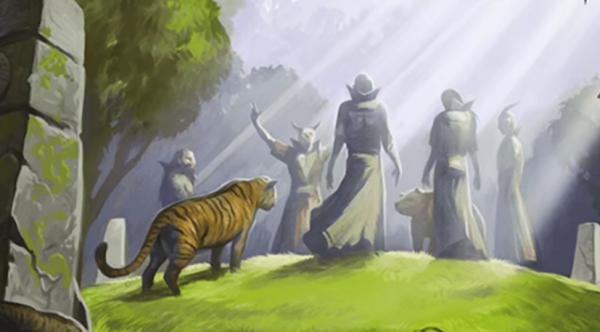Need a useful second level spell? Detect Thoughts” is a versatile tool for roleplaying, adventuring, and even battle. For all intents and purposes, I will be limiting this discussion to the “Detect Thoughts” spell in the Player’s Handbook 5th Edition.
Best uses of Detect Thoughts 5e
Here is a handy table! Scroll down for a full in-depth explanation on how to use the spell exactly.
| Use of Detect Thoughts | Description |
| Survey the Crowd | Access the surface level thoughts of a target creature without a saving throw to spot a guilty party or learn about a group’s intent. |
| Stalk Your Prey | Probe deeper into a target’s thoughts to learn about their emotional state and likes/dislikes. Great for gathering information or currying favor. |
| Find the Deceiver | Use to filter out shapeshifters, as it only works on creatures that can comprehend a language and have a minimum Intelligence of 4. |
| Mind the Gap | Use to access memories and potentially uncover evidence of memory-altering spells or mind control. |
| See the Ambush | Can be used to detect the presence of invisible characters or as a warning for a possible ambush. |
| Heal the Self | Can be used for self-healing and therapy by hearing your own thoughts reflected back to you. |
| Watch the Hands | Can be used in battle to detect the intentions of opponents. Consult with the GM for specifics. |
| Be the Guy | To make use of gathered information about a target’s desires and fears, it is necessary to act on it. People respond to stimuli differently, and understanding how a target values money can help inform how to use it to achieve a desired outcome. |

An in-depth explanation for each Detect Thought use
1. Survey the crowdSurface level ideas:
“Detect Thoughts” is a Level 2 Divination magic spell that gives the user access to the surface level thoughts of a target creature, i.e., what they are currently thinking about. Access to the surface level thoughts requires no saving throw. The spell has a duration of one minute and can change targets every action or six seconds. In one casting, the user could get the surface level thoughts of about ten people.
This could be used to spot a guilty party among a lineup or an opposing group’s current level of aggression. Leading questions or statements can be made to direct the surface level thoughts of the target. Need the password or the secret entrance to the hideout?
Find a member and ask for it. They could tell you off verbally, but they will most likely think of what the password actually is before they tell you off. Looking for a dangerous or obscure part of the library? You could ask the librarian where the more dangerous and esoteric subjects are kept.
2. Stalk your prey: Hidden information
For more information, the user has the option to probe the mind and trigger a Wisdom saving throw for the target. The user is then granted access to the emotional state of the target and the target’s deeper thoughts, such as a current crisis, likes, and dislikes. This is a great way to curry favor with your target.
You’d be surprised how easily people will open up if you can solve a problem they are currently having. Maybe you can show them similar taste in your choice of vintage red wine and disdain for local authority. An important factor to consider is that a deeper probe into the mind will let the target know that someone is indeed prying into their thoughts. If you are the only other person in the room, then by default, you are the only transgressor available.
So find a way to hide your presence while investigating. Better yet, have someone else do the direct questioning while you pry, and let them kill the messenger all they want.
3. Find the deceiver: What it looks like versus what it is
The target creature must have a minimum intelligence of four and be able to comprehend a language, or else be unaffected by the spell. The spell has a range of 30 feet and can penetrate some physical barriers but not two feet of rock, two inches of metal, or thin layers of lead. “Detect Thoughts” can be an effective filter for shapeshifters.
As the spell does not trigger on creatures that don’t speak languages or have super low intelligence, regular animals will not register on the radar. However, sentient beings posing as animals will have some underlying thoughts. So druids with a wild shape, a magic user using polymorph, or an animal hybrid such as a lycanthrope will produce at least some thoughts. The spell can also cover intelligent beings that can use camouflage, such as elementals or mephits.
The muddy puddles and the campfire could have more in mind for you than you think. The spell can also be used for the human shapeshifter. Maybe your target has been taken and replaced with a doppelganger. Or maybe the shapeshifters have made their way into your party. She may sound like the cleric you have been adventuring with, but those thoughts are a little more than off. Ask her questions only she would know, like where you two first met and who hired you for your first job, and then see what she thinks and if it matches.
4. Mind the gap: Looking at memories
Detect Thoughts can also be useful for repairing or finding clues about an altered mind. A willing target could let you in to try to figure out why he can’t remember Friday night. One can figure out if the blacksmith encountered a memory-altering spell or if he really did just drink more than he could handle.
If he is currently under mind control or compulsion, then the thoughts should reflect some oddities. The spell can also be used as a rough version of communication or translation during interactions where there is a language barrier. Use the spell to see if your ramblings and wild gestures to this barbarian tribe are working.
5. See the ambush: That unshakable feeling of being watched
Detect Thoughts can also be used to search for thoughts within a 30-foot radius. This can be used to find the presence, but not the location, of invisible characters. Maybe that feeling that you are being watched is more than a feeling, and someone is actually in that room with you. Given its 30-foot range, this spell is also helpful as a warning for a possible ambush.
Bloodlust for the expecting party can be quite palpable, don’t give them the chance. This can also be helpful to find those ghouls and ghosties that are known to have incorporeal forms. The dead still have plenty of thoughts and feelings, especially the vengeful ones.

6. Heal the self: Therapy can go a long way
The direct approach can be quite effective in self-healing and therapy. Do you think you could stand to hear your own thoughts reflected back to you in an echo? Sure, you think your thoughts. But have you actually taken the time to hear them said back to you?
There are plenty of times when the obvious good choice is the one said by someone else. Maybe that someone can be you. Maybe the captive you rescued is having a hard time adjusting back to the “normal” life. Talking to her about what you are seeing through your spell could give her some insight into how she is truly feeling versus how everyone is telling her how to feel.
7. Watch the hands: Detect thoughts in battle
Consult with your GM for specifics on this, as the ruling can change from GM to GM. Should the tides turn in your infiltration of the mind and trigger a combat, your spell would still be in effect, so why waste the mind power? I’ve reasoned with my GM that having Detect Thoughts up in a direct combat could give some advantage to fighting.
Some options could be a slightly increased armor class because I can see the attack being telegraphed, outright disadvantage to getting hit, or giving me a reaction to warn someone of the incoming attack and what the intent or target is. If the target is trying to make a breakaway, this could help me position my party to cover the exit or maybe even reveal the existence of a hidden exit.
8. Be the guy: Use the information
Having access to the innermost thoughts and feelings of a target is great, but the information is useless without action. The desires and fears of the target should inform the use of the information now gathered. Different people respond to stimuli differently.
The guild leader loves coin, so what does she use it for? Status? A well-placed blackmail note can strike some fear into her. Company? A little seduction and honey can go a long way. Greed? Haggling is the second oldest profession for a reason.
9. Take the help: Synergy with class
This section will talk about some abilities and spells to use in conjunction with the Detect Thoughts spell.
Wizards of the divination school present two perks:
- At Level 2, the Portent ability allows the wizard to gain insight into the future and use two D20 dice rolls later in place of a target’s saving throw or to ensure their own success in further prying into the mind.
- At Level 6, Expert Divination grants a renewed spell slot of lesser value for using divination spells. Since Detect Thoughts consumes a level 2 spell slot, it will grant the player a level 1 spell slot, essentially giving the player a “free” use of a level 1 spell. However, detect thoughts is a concentration spell, so the level 1 spell ideally should not require concentration.
- Mage Armor provides the player with an Armor Class of 13 + Dexterity Modifier, making the mage harder to hit should the encounter turn into combat. Although it may not sound like a lot, it lasts for eight hours from the casting.
- False Life grants the player 1d4 + 4 temporary hit points for one hour, serving as an emergency healing mechanism and giving the squishy wizard anywhere from 5 to 8 hit points, usually enough to take one more hit before falling unconscious.
- Unseen Servant creates an invisible, shapeless force that can be mentally commanded to perform simple tasks. This spell can be used to simulate an unsettling presence during an interrogation, commanding the unseen servant to make noises and interact with the environment during questioning. This can unsettle the target and make it easier to extract information. Additionally, the unseen servant can do menial tasks for the next hour.
If I am lucky enough to be paired with another magic user, a well-placed Hex can impose disadvantage on Intelligence checks to resist a successfully penetrated mind.
I have also used it in conjunction with a Zone of Truth for the particularly clever quarry, in case he or she is able to evade answering questions with tricky lawyer speak or technicalities. Paired with Invisibility, I would be able to sneak around an area and gain the general feel for a room, detecting the thoughts of up to ten people while remaining unseen.
The invisibility would also allow me to keep my anonymity if I decided to pry deeper into someone’s mind as the target would know someone was prying but not know whom.
